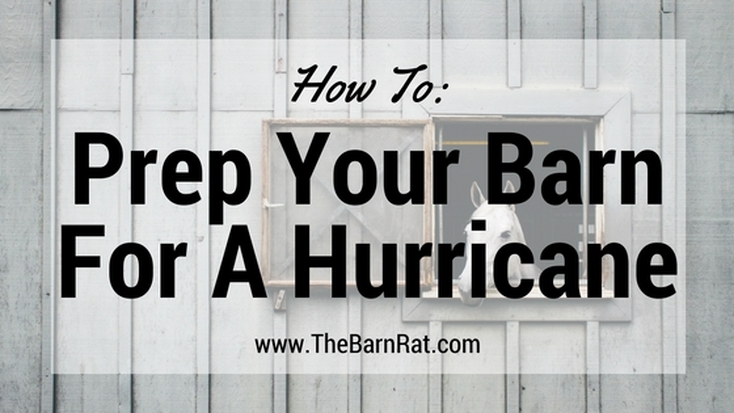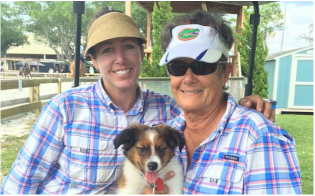|
Natural disasters are never an easy thing to deal with. But they take on a whole new level when you are responsible for the lives of animals. Most barns board between 10-50 horses and to prepare for something catastrophic is a huge undertaking. After living in Florida for a little over 3 years, seeing that hurricane Hermine has a trajectory right through where I was living breaks my heart and I am praying and sending all the good vibes I can to the people and I horses I cared for there. That being said here are a few tips you can use in case you are ever faced with such a situation. 1) It's all in the pre-planning. If you are building a barn in an area with the known threat of hurricanes there are certain things you should take into consideration when building your facility. Making sure the barn is at a higher elevation than the rest of the property prevents flooding. Also, having a well working drainage systems ensures that water runs away from the barn quickly and reduces standing water. 2) Have access to fresh water. Just because there is a sudden overflow of water because of a storm doesn't mean you are covered when it comes to fresh drinking water. Most of the time that water is full of debris and waste that isn't safe for drinking. Be sure to either stock up on clean water or have a purification system in place. 3) Have a generator with enough fuel. As is custom with big storms is power outages. Be ready with a generator that works and has enough amps to power the necessities. Also, a generator is only so helpful if you don't have enough fuel on hand to keep it running. 4) Have batteries on hand for flashlights and radios. The lack of power is often paired with cell phone towers being down as well. Make sure you have battery operated flashlights and radios on hand so you can stay in contact while checking your facility. Be sure to have plenty of extra batteries on hand as well because you never know how long it will take to regain power. 5) Be up to date on vaccinations. With lots of water and unexpected debris can bring unwanted mosquitoes and possible injuries. Having your horses up to date on all vaccinations can save them from all sorts of terrible diseases. 6) Have all medical records in one place. This should just be a general rule that you abide by in your daily life but in the midst of uncertainty it is of the upmost importance to know exactly where key pieces of paperwork are located. The last thing you need to be doing in a rush to get out is to be frantically looking for anything. 7) Find somewhere safe to go. There comes a time to make a very important decision, do you bunker down and wait out the storm or do you find somewhere else that is maybe safer to go. Another thing to consider is if the horses you have are healthy enough to make the journey. Often times older horses cannot handle the stress of travel and would maybe be better off staying at home or making a shorter journey. 8) Leave breakaway halters on every horse with contact information. Whether you decide to leave or stay at home it is important to identify your horses should the unthinkable happen and someone gets loose. If you are to do this NEVER use 100% nylon halters! Nylon halters will not break if a horse should get stuck and then they can panic and cause themselves serious injury. Always use either a fully leather halter, or a nylon halter with a leather headstall. Contact information can either be written on the nylon in sharpie or you can attach a notecard in a plastic baggie with duct tape. Be sure to leave a name, multiple contact numbers and the address the horse belongs to so they can make it home safely. 9) Be sure to stock up on hay and grain. The last thing you need is to run out of food for your horses! You should have a pretty good grasp on how much food you go through in a week and to be safe I would be prepared for up to two or three weeks. If you expect the weather to be really bad bring the food into the barn aisles to ensure the safety of those needing to feed, so they don't have to go outside in potentially dangerous conditions. 10) Close all doors and windows. As best you can lock down every side of the barn to prevent flying debris from entering and causing damage. If you don't have doors on the sides of your barn aisles using your trucks and trailers can create a much needed barrier. Just be sure to properly secure the trucks and trailers with jacks so they don't end up being part of the problem. 11) Have emergency medical supplies on hand. This will be a stressful time on your horses and as we all know horses have an incredible knack for hurting themselves. Be prepared with a variety of medications and supplies so you can handle a crisis the best you can considering getting the vet out to your property might be an impossible task. Hopefully these tips are just good things to know and you never have to put them into use. But, just in case make sure you always have an emergency preparedness plan! Anything to add to the list? Let us know in the comments!
1 Comment
12/29/2021 05:07:04 pm
I like your barn tips. I need a place to store my horses. I'll have to put them in a barn.
Reply
Leave a Reply. |
Categories
All
SponsorsInterested in sponsoring The Barn Rat? Be sure to contact us here!
|





